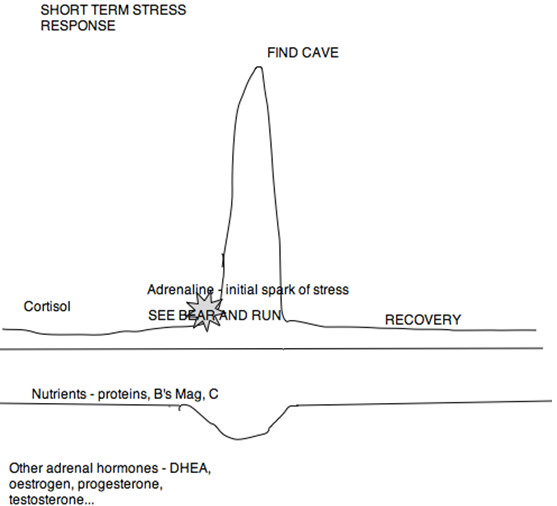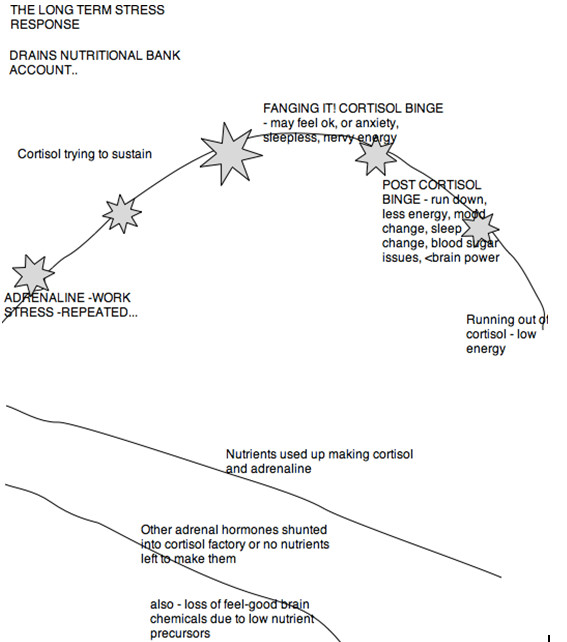By Linda Brown
BHSc Complementary Medicine
Can you ever remember a time when you have said ‘yes’ but you really meant ‘no’? And perhaps followed through based on obligation and felt resentment afterwards?
The recent term for this habit is called ‘People Pleasing’. We all like to please others but if (in our perspective) we are sacrificing our selves in the equation, we create a level of stress that is felt physically in the body.
The consequences of stressful thoughts and emotions are well studied: we release stress hormones from our adrenals (adrenaline and cortisol) and this initially quickens our heart rate, sends blood to our brain and muscles, and shunts our food resources into burning. But that’s not where it ends.
Generally speaking, we were designed to run from bears. We would see a bear, release hormones, run to a cave, and things would go back to normal. We would not suffer nutritional or hormonal imbalances beyond that.
We have coffee, we worry, we eat refined carbs, we work a lot, we have injuries, inflammation and pain, we work hard, we have babies with reflux, we drink alcohol, we have allergies. Some is positive stress (hormesis), but some is positively taxing.
This ongoing stress process aims to sustain the production of stress hormones. Hormones are partially made from nutrients, so the body shunts nutrients into the factory. Over long periods of time, this is at the cost of other hormones, such as progesterone, oestrogen, and testosterone, and energy giving DHEA; plus neurotransmitters such as serotonin (for relaxed happiness) and dopamine (for motivation and focus). All of these are crucial to our mood and cognitive function. Excessive stress hormone levels also dampen immunity, strain the heart, and affect digestion, weight, blood sugar, and sleep. Eventually it can drain us of energy.
In my observation, it seems part of reality to cope with the major challenges of our lives. In many cases we have no choice. How we support our bodies to sustain the process is crucial. I like to call this “accommodating the wobble.”
Modifiable lifestyle factors that support the body are:
- Eating protein at each meal
- Taking fish oil
- 3o minutes of cardio exercise daily
- 15 minutes of sun daily
- Sleeping (if you are in control of this) for approximately 8 hours
- Cutting down on alcohol to 2-3 standard drinks per week
- Having as little caffeine as possible
- Taking supplements to meet extra requirements
The key nutrients which support balanced bodily function while under stress are:
- B complex
- Magnesium (and for some Calcium also)
- Vitamin C
- Tyrosine (extra may help on top of dietary protein)
(However, nutrient loss is individual and multiple other deficiencies may appear).
Supplementing to accommodate “the wobble” can help to prevent a large number of stress-related issues arising.
But. There is another major factor that reduces the wobble. Doing less of what we could comfortably call non-crucial, and taking care of ourselves.
This is of course subjective, but it might include less face book, less news reports, less obligation dinners with acquaintances, or taking less responsibility for the smoothness of every conversation. It might mean saying no, and teaching others what our boundaries are. It might mean focusing on the things that work for us. And it might mean shifting our perspective and deciding that our choices are empowered – they are better than all of our alternatives, and we are making an investment for our conscience, family etc.
In my experience, when we genuinely say ‘yes’ and mean it, we suffer much less during a challenge. If we take care of ourselves as best as we can under duress, we are less likely to need loads of expensive intervention in the long run.
Interested in reading more… please let me know, or have a look through some of my favourites…
- Adrenal Fatigue by Dr James Wilson
- The Disease To Please by Dr Kay Redfield Jamison
- Don’t Be Nice, Be Real by Kelly Bryson
If you would like to talk more about any of these issues raised, please feel free to book a session in counseling, naturopathy or nutrition.
Linda



2 Responses to Lifestyle Stress and Managing Your Adrenal Health